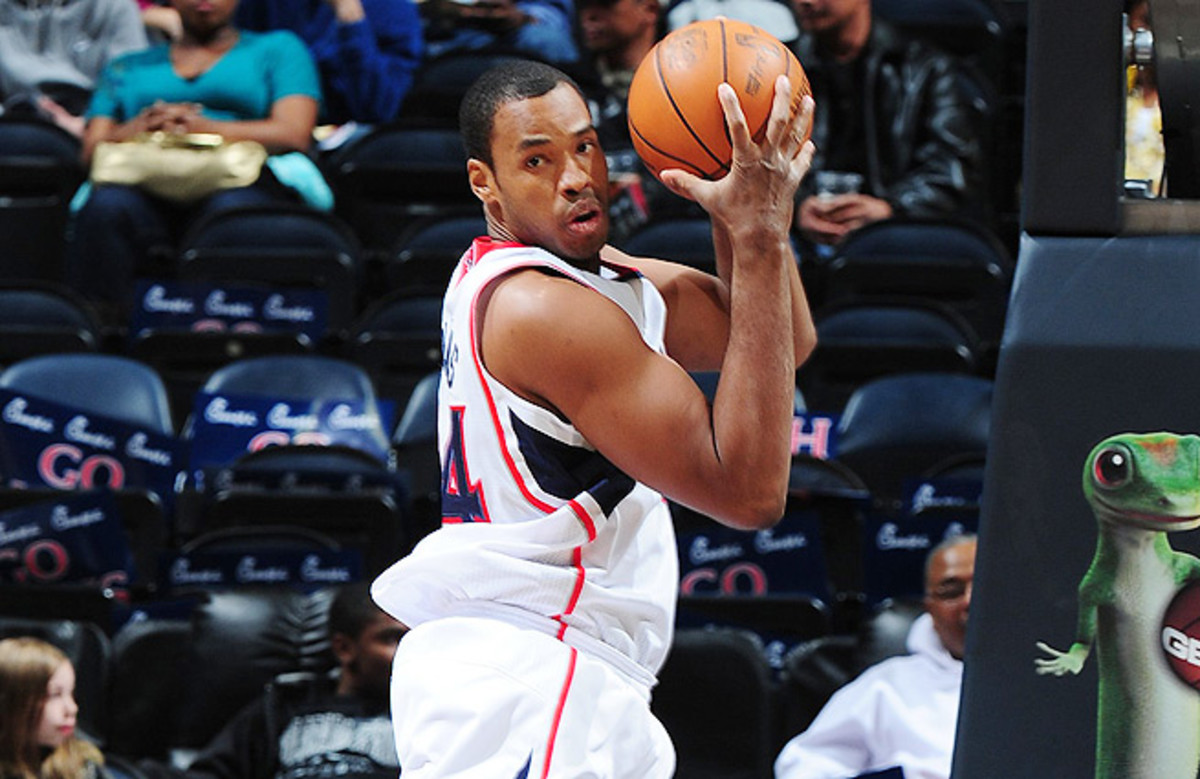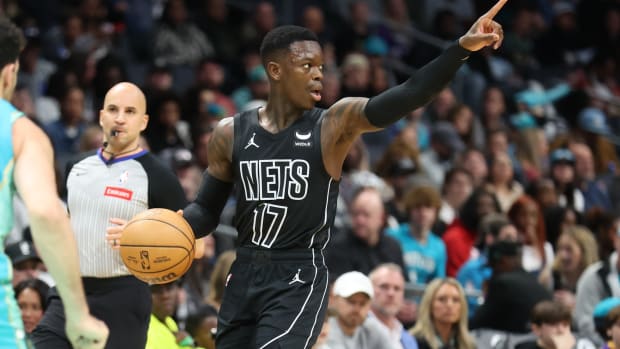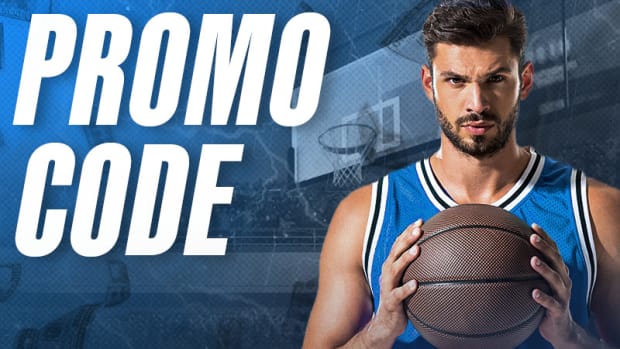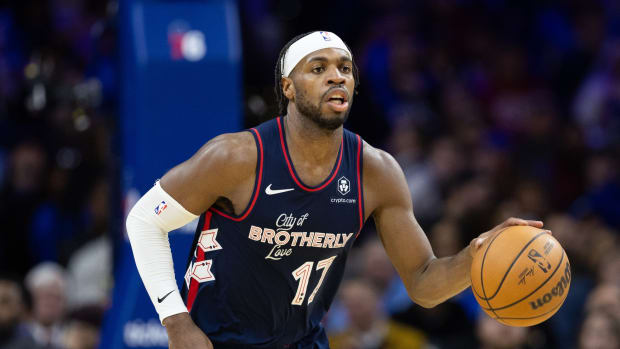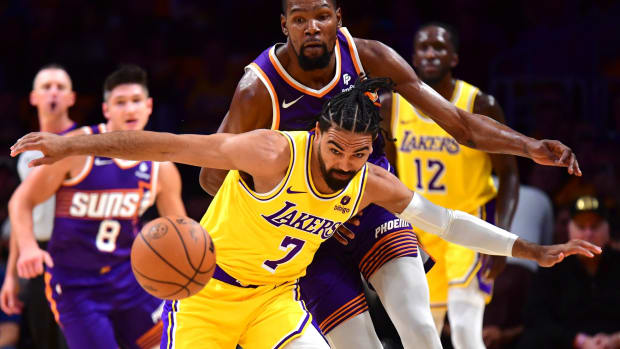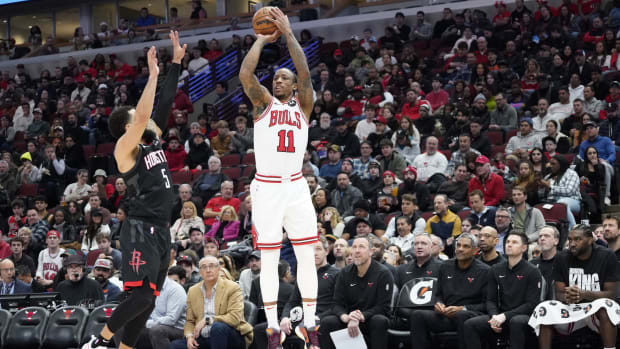The story behind Jason Collins' story: The interview
The dining room table of Jason Collins' home features an interesting centerpiece. A Celtics game ball balances atop a leather holder. Paul Pierce presented Collins with the ball after Pierce went for 40 in Boston's defeat of the Cavaliers last Dec. 19. Collins, the starting center that night, had one point, didn't attempt a field goal and fouled out in 23 minutes. But he set screens, grabbed rebounds, blocked a shot, protected the paint and played unrelenting team defense.
Collins features the ball prominently in his home, he says, because it is a metaphor for his NBA career. While he's started almost 500 games -- including six in the NBA Finals a decade ago -- he's made his bones as a durable, physical, flourish-free big man, capable of having an impact on a game without touching the ball. "I'm the guy on the court who doesn't like to draw attention to himself, who wants to lead by example," he said last week. "I've just been a guy who's accepted his role."
Now, his role takes on an entirely new dimension. Last Wednesday Collins invited two Sports Illustrated writers to his home. With both solemnity and humor (as well as a nervous pause to make sure his backyard pool wasn't overflowing), he began crafting today's account, a public declaration that he is gay.
At some point the idea of having no openly gay athletes in a league might sound as unimaginable as a ball field segregated by race. But today Collins becomes the first active male athlete in a major U.S. team sport to come out of the closet. Yes, that's a lot of qualifiers. Yes, it may be an artificial construct. But it is a milestone. Tens of thousands of men have played in the NFL, NBA, NHL and Major League Baseball. Until today none had expressed his homosexuality before retirement.
Collins didn't do this to make a political statement, much less to satisfy a sponsor. To his great relief, he didn't do it under duress; that is, he wasn't outed or "caught" by the smartphone paparazzi, "a fear that has trailed, trust me," he said more than once, "this is not a choice."
Collins is deeply religious and he took it as a sign when, on Wednesday morning, he read from a daily prayer manual his grandmother had given him. The day's entry was titled "Freedom" and read:
"The clarion call of freedom sounds within my soul, trumpeting the truth that the love of God liberates me from unhappiness, hurt or fear. I bid farewell to any emptiness from the past, and open myself to realizing my heart's deepest longing and aspiration."
Omens aside, Collins had simply grown tired. Tired of being alone; tired of coming home to an empty house; tired of relying on Shadow, his German shepherd, for company; tired of watching friends and family members find spouses and become parents; tired of telling lies and half-truths -- "cover stories like a CIA spy," he says with his distinctive cackle -- to conceal that he's gay. He was also tired of ... being tired. For most of his life, he's had trouble sleeping, which he attributes to struggles with his sexuality.
He's known "forever" that he's gay. But until last year it was personal, don't-go-there territory. "I kept telling myself the sky was red, but I always knew it was blue," he writes in this week's cover story for Sports Illustrated. Last summer, at 33, he finally came out to a small group of family members and friends, though none of them is in the NBA. Bolstered by their unconditional support, he decided he was ready, at 34, to go public. "Now," he says, "it's time to live my life genuinely."
Barely five minutes into a wide-ranging, hours-long conversation, Collins expressed a debt of gratitude for the other athletes, gay and straight, who helped accelerate this climate change, as it were. If he is the trailblazer, a team of others cleared the brush. Martina Navratilova, who's not only regarded as the first active athlete to come out but also did so at the peak of her career? John Amaechi, the NBA player who came out of the closet in 2007, four years after his NBA career ended? NFL players Chris Kluwe and Brendon Ayanbadejo, "straight allies," who became gay rights advocates, especially within the last year? "The words thank you aren't enough," says Collins.
The same leagues that once avoided issues of sexuality now almost seem to be competing in a tolerance sweepstakes. As Grant Hill, Jared Dudley and Steve Nash were filming PSA's, the league was bringing the hammer down on players using the word f-----. In homage to Brendan Burke, the late, openly gay son of NHL executive Brian Burke, the NHL and the NHL Players Association found rare common ground in becoming the first league to partner with a group dedicated to fighting homophobia in sports.
Even the UFC, seldom regarded as a citadel of progressivism, has a zero-tolerance policy on homophobia. Several weeks ago heavyweight Matt Mitrione offered a rant against a transgendered fighter that doesn't dignify repeating, but, suffice to say, was in consonance with Mitrione's nickname, Meathead. The organization announced that it was suspending Mitrione immediately, adding, "The UFC is a friend and ally of the LGBT community."
Mitrione learned the same lesson that 49ers cornerback Chris ("I don't do the gays ... can't be with that sweet stuff") Culliver learned before February's Super Bowl and former NBA star Tim ("I hate gay people .?... I am homophobic") Hardaway learned years before that. Times have changed and today, it is not the gay athlete, but rather the homophobe, who is staring backlash square in the face.
None of this is to say that Collins' transition will be free of awkwardness. Homosexuality in sports can still be met with more of a reluctant acquiescence than an open embrace. Amaechi received death threats after his announcement and often recounts his first press conference after asserting that he was gay. The opening question: "Are you HIV positive?" If you've been to a game lately, inevitably, two dudes will show up on the Kiss Cam and the crowd giggles. The rants of disgraced Rutgers coach, Mike Rice, are just the latest example that the homophobic F-word remains the lowest insult in the sports lexicon.
For years speculation about which active athletes are gay has been a prominent topic among fans, on message boards and, yes, in the media. Jared Max, an openly gay ESPN radio host, once told New York magazine that in order to have a real impact, the first active gay athlete would "have to be an All-Star. Someone with status. Someone whose teammates will be like, 'As long as he wins .?...'?"
While Collins wins -- he has been to the playoffs in nine of his 12 seasons -- he has never been mistaken for a star. Yet you could argue that he is singularly well suited for this new role. Since entering the league upon graduating from Stanford in 2001, he's been a bruising player, an enforcer who's laid out players, dispensed his share of trash talk, drawn technicals -- in short, whose style splinters every shabby stereotype of gay men being soft. (Might his aggressive style have been compensatory, a way to offset any suspicions about his sexuality? He smiles and says that he'll get back to us on that one.)
He is smart and well-spoken and carries himself with a charismatic intelligence. He is sufficiently well-connected that his "heads-up list" in advance of today's story included Condoleezza Rice and Bill Clinton. Maybe most important, he is metaphysically equipped for the inevitable fallout. He will not stand accused of being political and putting his sexuality in anyone's face. But he's willing to engage opponents and future teammates if any of them want to discuss his sexuality. "I wouldn't label myself an activist," he says. "Again, I just see myself as someone who wants to live his life genuinely."
Eloquent as he is in articulating why he decided to end his silence, he also expresses plenty of trepidation about what comes next. A free agent this summer, he wonders if this new status will affect his marketability. How will teammates react? Sure, he's been booed before -- "I've wanted to boo myself sometimes," he says -- but it's never come with the sting of homophobia. He cuts off a few minutes of speculative talk by shrugging. "Look," he says. "At the end of the day I don't know what's going to happen after I open this door."
Today, though, one of the last closets in American society has been pried open. It wasn't done with a crowbar. The hinges are still intact. But it opened and Jason Collins walked out. Proudly. Head high. A smile on his face. Surely there are other active athletes, maybe lots, still inside. But the capacity is one less than it was yesterday.
And the day after he came out to SI, Collins reported that he slept well. When he woke, the sky hadn't fallen in. And damn if it wasn't blue.






























